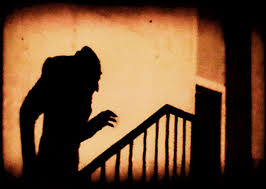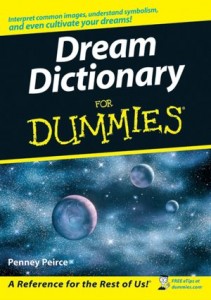The Mystery of Dreams Finally Solved
 Perhaps nothing to come out of the human mind has so fascinated, inspired, and confused us quite like dreams. There have been many theories as to what they are: the by-product of the mind categorizing memories as it organizes a day’s worth of data; the result of the brain trying to make sense of random neurotransmitter misfirings; the way conscious thought delicately deals with subconscious stress; the communication of the soul with the brain; frequencies our brainwaves pick up from our future selves, the collective consciousness, aliens, or powerful forces with mind-manipulating technology; and on and on. There may be some truth to any of these theories, but for me, the explanation that makes the most sense not only explains the science of what dreams are, but also explains how they are often able to foretell the future, particularly, our individual and collective destiny.
Perhaps nothing to come out of the human mind has so fascinated, inspired, and confused us quite like dreams. There have been many theories as to what they are: the by-product of the mind categorizing memories as it organizes a day’s worth of data; the result of the brain trying to make sense of random neurotransmitter misfirings; the way conscious thought delicately deals with subconscious stress; the communication of the soul with the brain; frequencies our brainwaves pick up from our future selves, the collective consciousness, aliens, or powerful forces with mind-manipulating technology; and on and on. There may be some truth to any of these theories, but for me, the explanation that makes the most sense not only explains the science of what dreams are, but also explains how they are often able to foretell the future, particularly, our individual and collective destiny.
We all know computers sleep, but do they dream? On some level at least, I believe they do. Back when I had my desktop Mac, there were times when it would suddenly awaken from sleep mode in the middle of the night, eerily turning on by itself at like 3am, as if being awoken by a rather vivid dream. Even with my laptop, sometimes when I awaken it from sleep mode, it gives me a split-second screen full of strange symbols and characters before transforming them into the icons I’m more familiar with. It’s not unlike the raw symbolism of dreams, These symbols could represent the semi-processed stimuli the brain attempts to make sense of, piecing them together with a narrative that becomes a dream. But what is this stimuli and where does it come from?
I’ve written before about how I believe the brain is like an antenna, picking up on the particular frequencies it’s tuned to, receiving programming from another realm that’s meant to help guide us through life. No doubt, these frequencies come in a raw, complex, heavenly form that our physical, time-constrained, earth-bound brains translate into various symbolic imagery as best they can. This antenna analogy works pretty well if you see the communication coming from our celestial souls as they connect with their host carnal bodies, but perhaps is even simpler to understand from within the perspective of life as a computer simulation.
I’ve already provided quite a bit of evidence as to why I believe that our experience of life is either a literal or figurative computer simulation. If you still don’t subscribe to the theory, perhaps this simple explanation of dreams from the simulation perspective will resonate more for you.
If we do live in a simulation, it would make sense that every once in awhile our programmers would need to update our code. This revised coding could make slight personality adjustments or update the scenarios that we’d individually or collectively face in the coming days (i.e., a stray dog chasing you, losing your job, meeting an old friend, etc.). But exactly when would these updates occur? Most likely when we’re offline, so to speak. And we’re offline while we sleep. That’s when we get these coding updates. They get downloaded into our antenna (or WiFi-attuned) brains. But our brains, not knowing the difference between the uploaded new coding and the coded stimuli it processes on a daily basis, tries to make sense of it the best it can—as symbolic images and archetypes. When they do a good enough job, the dreams literally come true, since the codes have been sent to update our experience. But even when something’s lost in translation making the symbolism vague at best, the dreams can always be interpreted through the generally accepted meaning of the symbols.
In other words, imagine updating a video game so that the main character will turn into the Hulk when it gets angry. The character, offline while the coding occurs, still picks up on it. The coding is written so that when the character experiences heavy emotion he transforms physically in relation to the intensity of that emotion. Symbolically, water represents emotion. Intense emotion could be represented as a roaring rapids or waterfall. Emotion turning physical could be freezing water into ice, and perhaps cracking. So while the coding is uploaded, the character could “dream”of rowing a boat gently down the stream, which turns to rapids, sending him over a waterfall, which then freezes, and cracks into a million pieces, because “Hulk smash.” Then, when being played in the game, the character turns into the incredible Hulk and something seems familiar about it all to him. It’s a déjà vu because the character subconsciously recalls the programming that set the scenario in action.
In our simulated world, we don’t turn into Incredible Hulks. But we do experience situations that evoke a response based upon a combination of our personalities and prior experiences—both of which could’ve been coded! As an example, I’ll use three dreams that I consider classic archetypes of my own life.
 The first I had when I was about five. I was running away from monsters in my childhood home. I ran upstairs to my parents’ room and found my mom crouching behind the bed. She gave me a look as to say, “follow me” and disappeared. But I didn’t know where she went or how to follow her. Peeking over the bed, I saw the monsters had just reached the top of the stairs and were coming right for me! And now, I was on my own.
The first I had when I was about five. I was running away from monsters in my childhood home. I ran upstairs to my parents’ room and found my mom crouching behind the bed. She gave me a look as to say, “follow me” and disappeared. But I didn’t know where she went or how to follow her. Peeking over the bed, I saw the monsters had just reached the top of the stairs and were coming right for me! And now, I was on my own.
Even though I had this dream as a child, I believe it represents a major plot point of my adult life—my mother dying just as I was facing a number of major challenging transitions. Without a mother to provide guidance, I was left with having to make many major life decisions on my own, forcing me to face my demons, step outside my comfort zone, and take a leap of faith—all experiences I believe I was meant to have.
Perhaps the being (soul, game-player, etc) that is playing my character wanted to experience these challenges so that it could make itself stronger in the outside realm. These might be issues it was dealing with, and by practicing within the simulation, it could overcome them in the outside world as well. While the basics of my personality may have been coded in this realm to be similar to that of the game-player, and the experiences created to incite certain decisions, these decisions would likely be entirely made by the player, thinking that he’s really in the game. This way, when he is done with the game, the decisions and any related growth from them, are all real!
In other words, I am actually the player, playing a character in a simulated world that’s so realistic, I don’t know it’s all been created to help me grow. In this realm, my growth can be completely manipulated and controlled in order to yield an intended result. In the outside, completely random world, such growth could take hundreds or even thousands of years to happen naturally on its own.
In the second dream, which I had at about six or seven years old, I was carrying a puzzle I’d just completed downstairs, probably to glue together and post on the wall in the basement as we used to do. But I tripped and the puzzle pieces went all over the place. Frustrated by all my hard work going to waste (never mind my bruised body from falling down the stairs), I immediately began to reassemble the puzzle. Suddenly, there was a flash of light and a huge, creepy witch appeared. Unable to make the decision as to whether I should run for my life or finish the puzzle, I froze—my computer-brain reading a conflicting error and crashing.
Of course, most people would run from certain danger. But from the perspective of my perfectionistic personality, it makes total sense as to why I would consider putting my life in jeopardy rather than letting go of fixing something I’d initially worked so hard to complete. It’s a theme that’s come up again and again in my life. The dream could’ve been a result of a basic personality coding—that of a perfectionist. It also could’ve been a prototypical situation that my character will continually face until he learns to either let go of unfinished projects that aren’t serving him, or deal with challenges that are preventing him from finishing them.
Trying to fight or flee from witches while simultaneously putting together a puzzle isn’t a very effective strategy. Even though that, figuratively speaking, it’s one that I myself, and many of us, continually attempt to do. Perhaps you can think of an example from your life where you are trying to focus on a goal while continually having to deal with other projects and challenges that may not even be necessary from the perspective of the big picture.
In the third, and creepiest dream, which I had some time between four and eight years old, I was sitting on my parents’ bed with my dad, I think. Maybe we were reading a book. Somehow, he became preoccupied with something else, maybe talking on the phone, and for some reason that I don’t recall, I decided to lean over the side of the bed and look underneath. I just now remembered that when I looked into the darkness there was a strange flash, just as in the witch dream. From this point forward, the dream was no longer my point of view, but that of me watching myself like a movie. As I lifted my head back up to return to the top of the bed, I saw that I no longer had eyes, just dark, empty sockets.
 Will looking too deeply for answers leave my blind to the here and now? Will my curiosity to see what’s behind the curtain result in my lack of vision for my own reality? Or will my search for wisdom leave me like a blind, yet wise, old man who no longer needs to rely on his senses to see the truth of existence? I’ve come up with hundreds of interpretations and meanings for all three of these dreams. I believe the reason that they’ve haunted me for all these years is because they are so intertwined with who I am, my life story, and perhaps, the major challenges I’m meant to overcome. Perhaps, you have some dreams that haunt you as well. Perhaps they hold answers to questions you have about your life now.
Will looking too deeply for answers leave my blind to the here and now? Will my curiosity to see what’s behind the curtain result in my lack of vision for my own reality? Or will my search for wisdom leave me like a blind, yet wise, old man who no longer needs to rely on his senses to see the truth of existence? I’ve come up with hundreds of interpretations and meanings for all three of these dreams. I believe the reason that they’ve haunted me for all these years is because they are so intertwined with who I am, my life story, and perhaps, the major challenges I’m meant to overcome. Perhaps, you have some dreams that haunt you as well. Perhaps they hold answers to questions you have about your life now.
Just as with the videogame character example above, when our life catches up to the coded programming that manifested as our dream, the result feels familiar. The similarities from your subconscious coding and conscious experience resonate, which brings about feedback that we experience as déjà vu. If the subconscious memory enters the conscious mind, we get a premonition. In this case, something familiar from your coded upload matches your current experience, triggering a memory. But it’s a memory that hasn’t been played out yet. As is true of any videogame character, nothing can happen in our experience unless it’s already been programmed. Recalling the program before it’s played out is the premonition, and it could be triggered moments before something is about to happen, or weeks, months, or even years before. If it’s triggered any time before, it’s a premonition, if simultaneously, it’s a déjà vu.
If you’d like to see whether there’s something to this theory, the first thing you need to do is remember more of your dreams. I recommend sleeping on your back for the best reception (your pineal gland antenna gets better WiFi reception that way). When you first wake up, stay still with your eyes closed if you can and recall as much of the dream as you can. Then, immediately write it down. The more you focus on doing this, the more dreams you’ll start to remember. Try to wake up through natural means or at least natural sounds, rather than a beeping clock alarm. Maybe ocean waves or gentle instrumental music.
If you have recurring imagery in your dreams—say, elevators—every time you experience it in your waking life, ask yourself whether or not you are in a dream. Looking at your watch or phone is a good test. It’s rare that you can read small print in a dream. Get into the habit and after awhile, you’ll remember to do the test in your dream. Once you do, you’ll realize you’re dreaming; creating a lucid dream that enables you to have experiences and get answers that wouldn’t be available to you otherwise.
 Most of the symbolism in dreams is pretty universal, explaining how there can be dream dictionaries that explain them. In other words, given similar coding, different brains would attempt to decipher using similar patterns and symbols. Just as different computers would do the same. It’s as if the brain isn’t meant to make sense of the incoming code, just run the program. Since our brain is designed to try to make sense of incoming stimuli, it does the same with the incoming code, and dreams are the result.
Most of the symbolism in dreams is pretty universal, explaining how there can be dream dictionaries that explain them. In other words, given similar coding, different brains would attempt to decipher using similar patterns and symbols. Just as different computers would do the same. It’s as if the brain isn’t meant to make sense of the incoming code, just run the program. Since our brain is designed to try to make sense of incoming stimuli, it does the same with the incoming code, and dreams are the result.
I don’t think I’m the first person to have this interpretation of what dreams actually are. In fact, I think there are those out there who are completely aware of the rules of this game, are able to manipulate them for their own benefit, and maybe even control the actions of others. What we think of as the Illuminati may be avatars—powerful players who use our world as a sort of personal amusement park to play out their own fantasies.
Maybe we’re all here by choice, but some us choose to play a challenging game and others are playing just for fun. Still, it seems like the more you play just for the physical, “illusionary” benefits of the game, the more you become like the game: reactionary, controlled, robotic—another soulless zombie. Worse still, whatever riches you accumulate in the game, can’t be taken with you when you leave it. In these cases, an incredible opportunity for growth has been traded for mere fleeting thrills.
On the other hand, if you can go outside your comfort zone and rise up and away from the temptations and dramas that can pull you down in the game of life, you get more in touch with your true self—the player outside of the game. The goal is to become the highest version of who that being hopes to be. Once you can completely re-connect with that evolved version of your true self, you are reunited with who you really are, and don’t have to come back for another round of Life On Earth.
May your inner spark grow to light your way,
The Layman
Henry Fuseli’s “The Nightmare” image found here.
“Nosferatu” movie image found here.
The Lost Book of Nostradamus, plate 72 can be found here.
“Dream Dictionary For Dummies” can be found here.
Subscribe!
To be notified of new posts by email, Facebook, Twitter, or more, use the Share/Save form below or click HERE.
Every “Diary of a Layman” is Now Online!
The orowriter.com website and The Layman’s Answers to Everything blog are up and running! My hope is that they will allow all of us to benefit from each other’s wisdom with posted comments and exchanged ideas. For updates on new columns, videos, interviews, and more, join The Myth of Lost Facebook page or follow me on Twitter!
New Friends:
If you aren’t familiar with my books, here’s a brief synopsis:
The Layman’s Answers To Everything is a spiritual comedy (or spiromedy) about an unlucky guy who believes he’s meant to do something amazing, but has no idea what it is. After experiencing many challenges and meeting a bizarre cast of characters, he stumbles upon secret messages hidden in TV, movies, and music that are aimed at guiding humanity. Using these messages, he starts a new religion that changes his life, and ultimately, the world. This is so much more than just a story though, because throughout the journey, we learn how to discover and fulfill our own destiny using the clues of the universe that are all around us.
The Lost book is called, The Myth of Lost: Solving the Mysteries and Understanding the Wisdom. It not only reveals an alternate solution that actually explains all the mysteries of the show, it also explains how the show’s wisdom can be applied to our real lives.



11 Responses Leave a comment
Thanky Thanky for all this good inafimotron!
You’re welcome. Almost thought you were doing a play on words that was going to say “inafilmoTron” referencing the simulation references in this article. Subconscious perhaps?
Pretty damn good. Thanks for this.
Glad you liked it. Hope it helped provide some clarity.
Just wondering if you have knowledge of or have experienced sleep paralysis or out of body experiences (while sleeping)? I have many times, and while these are certainly connected to dreaming, I would consider them next level shit for lack of better words. How do you see these phenomema in the context of the simulation theory?
Ever take a thumb drive out of a computer improperly, leaving the icon stuck on the desktop with no connection to the actual drive? It’s like that.
I’ve had dreams since I was a kid where I “wake up” in the dream and find that I’m just reading a book about what I was dreaming. Or a few where I’ve “woken” and am wearing like a virtual reality headset or something along those lines. How weird is that?
Also, is there a reason you don’t blog anymore?
If you had those dreams BEFORE seeing virtual reality or movies about it, they definitely point to a higher understanding coming through your subconscious. Reading the book about what you’re dreaming relates to the code of your life, and your higher self recognizing this world for the illusion that it is. Everything you have done, are doing, or could ever do, has already been written.
As for why I don’t blog anymore. I have at least two more I’d like to post, but haven’t had a chance yet this year, mostly because of this: https://thelaymansanswerstoeverything.com/2012/12/is-time-speeding-up-or-is-it-just-you/
and this: https://thelaymansanswerstoeverything.com/2013/10/how-to-bottle-feed-twins-pts-1-3/
BION I’m imeespsrd! Cool post!
I wish you many blessings.
Thank you for existing.
Preserved about 300 thousand.